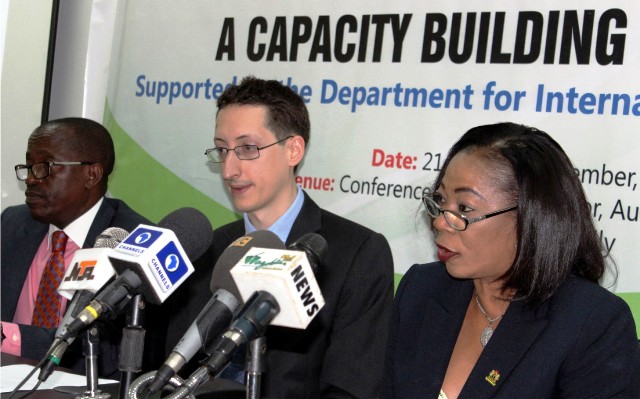Business
Ministry Sensitises Small Businesses On Empowerment Scheme

The Department of Commercial Credit Scheme in the Cross River State Ministry of Agriculture and Natural Resources, has concluded a one day sensitisation programme, organised to create awareness on the ongoing Federal Government’s Entrepreneurship Empowerment Scheme for small scale business owners, artisans, small scale farmers and enterprising youths in Nigeria known as ‘’Market Moni’’
According to the Director, Commercial Agric Scheme, Mr Alban Nwogu, who was represented by Mr Joseph Ekpo, interested individuals who wish to access the loan, must identify with a registered and accredited trade group, market association, and cooperative group ranging from 10 to 20 members.
Joseph further added that the cooperative group an individual has identified with must nominate a person and also be willing to stand as guarantors for the individual.
He further stressed that individuals belonging to such cooperative groups that have met the necessary requirements, must have a valid Bank Verification Number and a business location that would be verified by the empowerment agents before such loan is granted, maintaining that any cooperative group members can access loan ranging from N10,000 to N100,000, depending on the individual ability to repay the loan within the stipulated time.
Meanwhile, First Bank Nigeria Limited has indicated interest to partner with Cross River State Ministry of agriculture and Natural Resources, to improve Agricultural performance in the state.
The First Bank team from Calabar main branch, made this known during an official visit to the Commissioner for Agriculture and Natural Resources, Prof. Anthony Eneji.
Eneji who received the team in the Ministry, expressed delight over the concern shown by First Bank, adding that the state has successfully carried out various value chain projects such as rice, oil palm, cassava, cocoa, and yams production but will love to improve on the quantity of production in order to feed our local factories, companies and also meet the international market standards and demand.
Friday Nwagbara, Calabar
Business
Fidelity Bank To Empower Women With Sustainable Entrepreneurship Skills, HAP2.0
Business
President Tinubu Approves Extension Ban On Raw Shea Nut Export
Business
Crisis Response: EU-project Delivers New Vet. Clinic To Katsina Govt.
-

 News2 days ago
News2 days agoAmend Constitution To Accommodate State Police, Tinubu Tells Senators
-

 Politics2 days ago
Politics2 days agoSenate Urges Tinubu To Sack CAC Boss
-

 News2 days ago
News2 days agoDisu Takes Over As New IGP …Declares Total War On Corruption, Impunity
-
Business2 days ago
President Tinubu Extends Raw Shea Nuts Export Ban To 2027
-
Business2 days ago
Crisis Response: EU-project Delivers New Vet. Clinic To Katsina Govt.
-
Business2 days ago
President Tinubu Approves Extension Ban On Raw Shea Nut Export
-
Sports2 days ago
NDG: Rivers Coach Appeal To NDDC In Talent Discovery
-
Business2 days ago
Fidelity Bank To Empower Women With Sustainable Entrepreneurship Skills, HAP2.0

